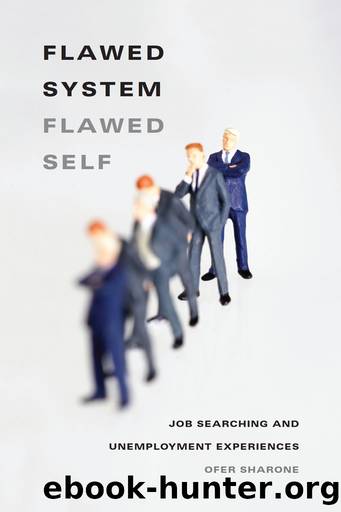Flawed SystemFlawed Self by Ofer Sharone

Author:Ofer Sharone [Sharone, Ofer]
Language: eng
Format: epub
Tags: Social Science, General, Sociology, Business & Economics, Careers, Job Hunting
ISBN: 9780226073675
Google: GZKvAAAAQBAJ
Barnesnoble:
Goodreads: 18497982
Publisher: University of Chicago Press
Published: 2013-10-16T00:00:00+00:00
CHAPTER SIX
A Cross-Class Comparison
The Blue-Collar Diligence Game
Reggieâs first words to me were, âMy mind is about to explode. Not having a job, it can drive you to go use drugs, can drive people to hit their wife, drive people crazy. Iâve seen it. I have seen a lot.â Two months earlier, he had lost his job working in a warehouse. Like the American and Israeli white-collar workers discussed in prior chapters, Reggie had repeatedly hit frustrating roadblocks in his search for a new job. Yet his experience of unemployment, and that of most blue-collar American workers I interviewed, followed a different pattern. It was the product of a different job-search game.
The prior chapters described the workings of the chemistry game in the American context and the specs game in the Israeli context. Although these chapters described the specific labor-market institutions that underlie each of these games, a question may remain about the role of broader national cultures in ultimately shaping unemployment experiences. For example, it may be suggested that it is the American culture of individualism that explains the focus on chemistry and the personalized self-blame. The cross-class comparison described in this chapter will show a group of American job seekersâthose seeking blue-collar jobsâwho are not playing the chemistry game and who have a very different experience of unemployment. This comparison provides further evidence that it is the job-search games and the specific institutions that underlie them, and not a widely shared national culture, that drives the unemployment experience.
The American blue-collar job search does not focus on interpersonal connection, as in the chemistry game, or on the job seekerâs list of objective skills, as in the specs game. Instead, it focuses primarily on whether the job seeker is an eager, compliant, and hard worker, a filter I summarize with the word âdiligence.â
True, as in the chemistry game, the focus is on an intangible attribute, but it is a very different attribute than the interpersonal fit sought in the chemistry game, as we will see below. In the diligence game, chemistry may in fact be a liability. The diligence game and the labor-market institutions dominant in the American blue-collar context ultimately generate a search experience that in important ways resembles the experience of playing the specs game. In a surprising finding, the job-search experience of blue-collar American job seekers is closer to that of white-collar Israelis than to that of their own white-collar compatriots. This suggests that to understand job-search and unemployment experiences, more important than culture or class is the specific job-search game one must engage in when looking for work and the concrete labor-market institutions that structure it.
The data presented in this chapter were gathered through in-depth interviews with job seekers who made use of a state-funded One-Stop job-search support center in the San Francisco Bay area (which I will refer to as âWorkSourceâ). This center is one of many similar One-Stop centers across the state of California and the United States and is part of the larger support structure that also encompasses AmeriSupport.
Download
This site does not store any files on its server. We only index and link to content provided by other sites. Please contact the content providers to delete copyright contents if any and email us, we'll remove relevant links or contents immediately.
The Bone Broth Miracle: How an Ancient Remedy Can Improve Health, Fight Aging, and Boost Beauty by Ariane Resnick(16611)
How to Be a Bawse: A Guide to Conquering Life by Lilly Singh(7486)
The Fat Loss Plan by Joe Wicks(4921)
The Ultimate Bodybuilding Cookbook by Kendall Lou Schmidt(3945)
The French Women Don't Get Fat Cookbook by Mireille Guiliano(3661)
A Jewish Baker's Pastry Secrets: Recipes from a New York Baking Legend for Strudel, Stollen, Danishes, Puff Pastry, and More by George Greenstein(3601)
Better Homes and Gardens New Cookbook by Better Homes & Gardens(3595)
Super Food Family Classics by Jamie Oliver(3418)
Dinner in an Instant by Melissa Clark(3163)
Bread Revolution by Peter Reinhart(3142)
Tom Kerridge's Dopamine Diet: My low-carb, stay-happy way to lose weight by Kerridge Tom(3110)
Body Love by Kelly LeVeque(3060)
Ottolenghi - The Cookbook by Yotam Ottolenghi(2946)
Flavor Flours by Alice Medrich(2866)
Tone Your Tummy Type by Denise Austin(2847)
The Fat Chance Cookbook by Robert H. Lustig(2836)
Oh She Glows Every Day by Angela Liddon(2780)
LL Cool J's Platinum 360 Diet and Lifestyle by LL Cool J(2736)
The Kitchen Counter Cooking School by Kathleen Flinn(2520)
